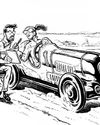
Businesses around the world are looking for ways to help in response to the pandemic while continuing to sell products and services and keep people employed. From the C-suite to managers to employees at all levels, great ideas are popping up. But how can they be turned into reality as quickly as possible?
I have some experience on this front. When Hurricane Katrina struck the U.S. Gulf Coast in 2005, I was with the advertising and marketing agency Saatchi & Saatchi. My team and I were sitting in a bar with the brand team for Tide, one of our biggest clients. We got to talking about how we’d love to create something to help. Pens came out, and together we scribbled on the back of a napkin. Two weeks later, our idea came to fruition: Loads of Hope, trucks filled with working washing machines and dryers. People struggling in the aftermath could drop off their dirty clothes, and we would clean and fold them. These mobile laundromats continue to be deployed to afflicted areas today, and have helped tens of thousands of families.
Early during the COVID-19 pandemic, a contact in Asia and I got to talking about how kids would need washable masks for school. Within a few weeks, we had Crayola on board, and the SchoolMaskPack program was launched. Families can buy a set of five color-coded kid-sized masks, one for each day of the school week, which can be washed and reused. Demand has been so great that the manufacturer recently had to expand operations to multiple countries.
In both these cases, we were able to move very quickly because we had three crucial ingredients for fast-tracking new ideas.
Innovation as a mission
This story is from the Winter 2020 edition of strategy+business.
Start your 7-day Magzter GOLD free trial to access thousands of curated premium stories, and 9,000+ magazines and newspapers.
Already a subscriber ? Sign In
This story is from the Winter 2020 edition of strategy+business.
Start your 7-day Magzter GOLD free trial to access thousands of curated premium stories, and 9,000+ magazines and newspapers.
Already a subscriber? Sign In

Transforming information into insight
Focus on six organizational elements to build a world-class data and insights capability.

THE URGENT NEED FOR SOPHISTICATED LEADERSHIP
The pandemic has highlighted a series of paradoxes inherent to the work of leaders. What comes next will depend on how well leaders face up to them.

The road to successful change is lined with trade-offs
Rather than trying to convince people your change initiative is the right one, invite them to talk openly about what it might take to implement it: the good, the bad, and the frustrating.

Sustaining productivity virtually
Maintaining productivity levels among remote employees is an enduring challenge. Here are five ways to help businesses and employees thrive while people work at home.

FORWARD TO normal
Entertainment and media companies are building business models that are resilient to the enduring changes in consumer behavior ushered in by COVID-19.

How leaders can promote racial justice in the workplace
Embrace four principles to turn today’s diversity, equity, and inclusion initiatives into sustained progress.

CREATING THE OFFICE OF THE FUTURE
In a remodeled world, it is vital for companies to reinvent ways of working.

Consumer companies must take leaps, not steps
As shoppers show how quickly they can adapt to external shocks, retailers will need to radically reconfigure their business models.

Businesses can fast-track innovation to help during a crisis
“Unrealistic” timelines can actually work. Here’s how.

Agility and experience management work better together
Many companies achieve early wins with separate transformational efforts, then stall. But if combined and enhanced using “return on experience,” or ROX, measures, these two programs can unlock each other’s potential.